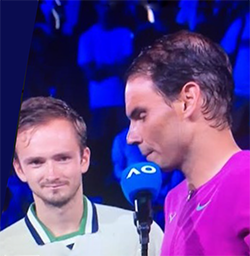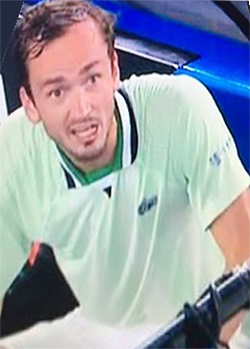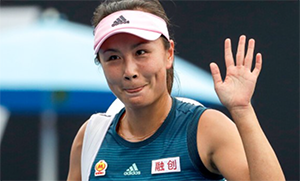VIEW AND DOWNLOAD WORLD TENNIS GAZETTE VOL. 15 NO. 2
By JOHN MARTIN

Tennis Channel Screen Capture
Is it possible that the 2022 Australian Open suffered more than its share of controversy?
Every international Grand Slam Championship — from Australia to France to England to America — faces moments of doubt and controversy.
But beginning with Novak Djokovic’s failed attempt to compete without a vaccination required of every other player, Melbourne struggled this year with what seemed a never-ending series of arguments and disagreements between players, officials and even a spectator or two.
It’s true that Aussie Ash Barty’s historic singles championship and an all-Australian men’s doubles final were triumphs.
At the same time, both men’s singles finalists waded through major controversies.
In the semifinals, Daniil Medvedev complained loudly and bitterly that the chair umpire was ignoring Stefanos Tsitsipas’s father sitting in a courtside box. Medvedev insisted that father was coaching son in Greek. The umpire sent an official to monitor and then warned Tsitsipas about his father’s conduct. Afterward, noted The New York Times correspondent Christopher Clarey, Tsitsipas did not win another game and Medvedev won the match and a place in the final.

Tennis Channel Screen Capture
Earlier, Rafael Nadal found himself the target of accusations in another episode. During his quarterfinal match against Denis Shapovalov, the Canadian complained that Nadal had been given an unreasonable amount of time between points and during a medical timeout that expanded into a bathroom break.
Thanks to Clarey’s alert reporting, we learned that seven minutes elapsed between the end of the fourth set and the beginning of the fifth, which opened with Nadal bouncing the ball many times at the baseline as he prepared to serve.
“They are legends of the game,” Shapovalov said, “but when you step on the court it should be equal.”
“I respect everything that Rafa has done and I think he’s an unbelievable player,” Shapov-alov told reporters.
“But there’s got to be some You feel like you’re not just playing against the player; you’re playing against the umpires, you’re playing against so much more. It’s difficult. I mean, it was a big break after the fourth set and for this reason the momentum just goes away.”
Shapovalov called the corps of chair umpires “corrupt” and was later fined $8,000, the most levied on a single player.
Nadal disagreed that he had been given an unfair advantage. “I just think he’s wrong,” he said.
As if those on-court squabbles weren’t enough, a miniature international confrontation began to emerge one morning late in the first week.
When a spectator arrived wearing a shirt that asked “Where Is Peng Shuai?”, an AO security agent ordered the shirt removed or entry would be denied.

Los Angeles Times
For about 24 hours, dark visions flashed. The Australian Open appeared to be paying crude political deference to China in its alleged mistreatment of one of the country’s finest former players, She earlier accused a former high-ranking party official of sexual mistreatment.
But a satisfactory ending emerged quickly. After free -speech complaints from Martina Navratilova on the Tennis Channel, the AO leadership, including CEO Crag Tiley, came to its senses and reversed the ban on clothing that carries political speech.
Then, to everyone’s surprise, a magical moment arrived in the final minutes of the tournament.
As Nadal and Medvedev stood alone on a small platform awaiting their trophies, the flying camera lens called Spidercam settled on them.
After five hours and 24 minutes of tennis combat, through minute after minute of crushing strokes, raised fists and focused scowls, the two men were now looking at each other and falling into smiles. Hands gesturing. Eyes rolling. A grin flashing.
At my distance (10,353 miles away in New York), they seemed to be confiding in each other. Were they? We’ll probably never know.
No microphone was close enough to hear. Only a television lens hovering over them. But the sight was magical.
After barely 20 seconds, they turned away from each other, stepping back, looking thoughtful and mildly sheepish.
Later, Medvedev revealed that he had joked to Nadal that he felt so beaten that he needed to retire.
“During the match,” he told the audience,“ I tried just to play tennis, but after the match, I felt like I retired. I asked him to sign my card.”
A retirement congratulation card? The crowd took that way and roared with laughter.
For his part, Nadal was spectacularly gracious: “I know it’s a rough moment, Daniil. You are an amazing champion. I have been in this position a couple of times in this tournament to have chances to have the trophy with me but I don’t have any doubt you will have this trophy a couple of times in your career.”
Nadal had trailed by two sets to none and was aced 23 times. He served a mere 3 aces in return. So it’s not surprising that he called it “one of the most emotional matches of my career.”
After weeks of turmoil, the world witnessed a redeeming touch of harmony.